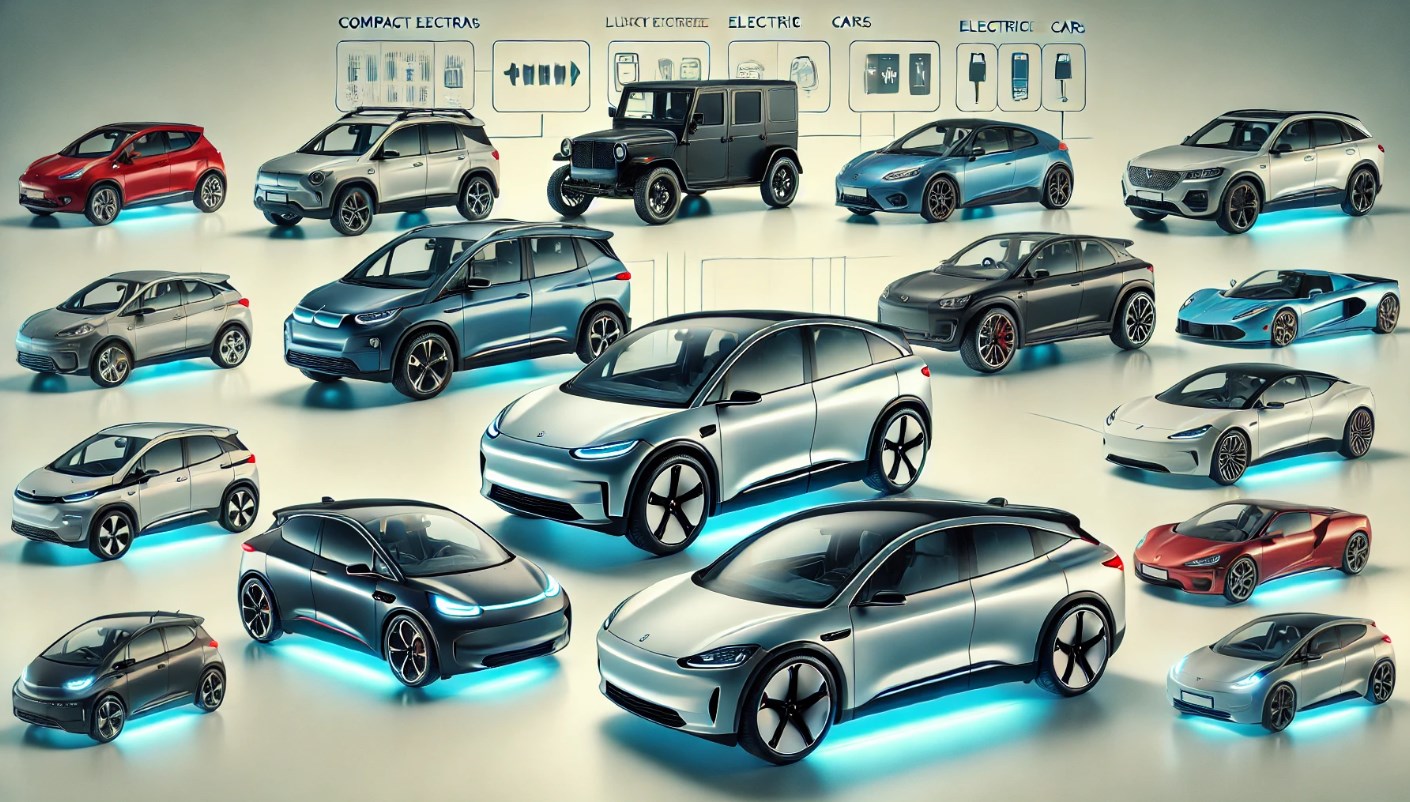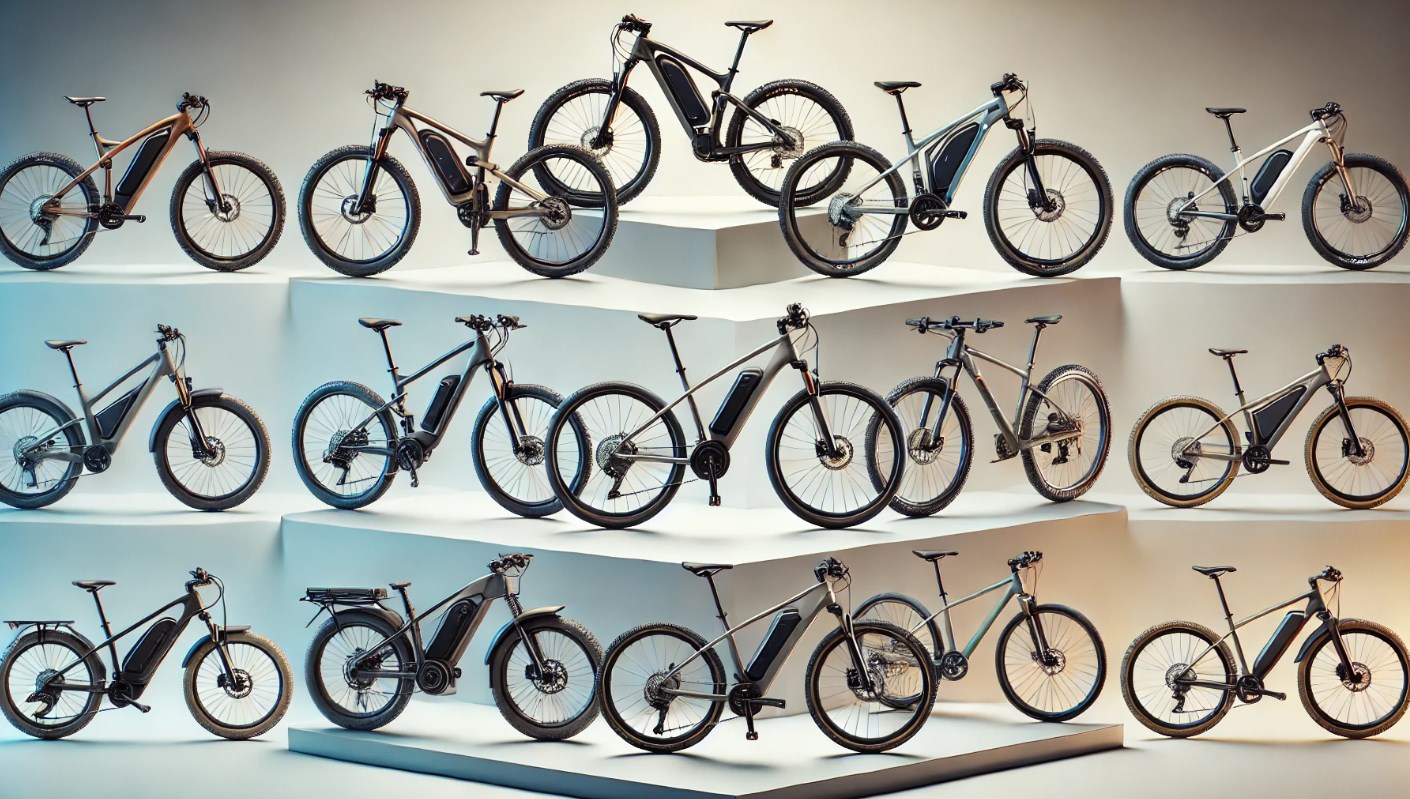As the world transitions towards cleaner, greener energy solutions, electric vehicles (EVs) have become a critical part of the global automotive landscape. China has emerged as a key player in the electric vehicle market, both in terms of production and consumption. With its rapidly growing domestic market, China is not only home to some of the largest EV manufacturers but also a major exporter of electric cars worldwide. The country’s vast production capacity, government incentives, and increasing commitment to environmental sustainability have made it a leader in electric vehicle development.

Major Types of Electric Cars
Electric cars have evolved significantly over the past few decades. Today, there are different types of electric vehicles designed for various purposes, ranging from compact city cars to high-performance models. Here are the main types of electric cars that are gaining popularity worldwide:
1. Battery Electric Vehicles (BEVs)
Battery Electric Vehicles (BEVs) are fully electric cars that rely solely on batteries to power an electric motor. These cars are charged using an external power source, such as home charging stations or public charging infrastructure.
Key Features:
- Power Source: 100% electric, with no gasoline engine.
- Range: Varies between 150 miles to over 350 miles on a full charge, depending on the model and battery capacity.
- Emissions: Zero emissions, making them the most environmentally friendly choice.
- Charging: Can be charged at home or at public charging stations.
BEVs are the most common type of electric vehicle on the market, thanks to their zero-emissions benefits and advancements in battery technology.
2. Plug-in Hybrid Electric Vehicles (PHEVs)
Plug-in Hybrid Electric Vehicles (PHEVs) combine an internal combustion engine (ICE) with an electric motor. These cars can run on electric power for shorter distances but have the option to use gasoline or diesel for longer trips.
Key Features:
- Power Source: Combination of battery-powered electric motor and internal combustion engine.
- Range: Typically offers 20-50 miles on electric power alone, after which the gasoline engine takes over.
- Emissions: Lower emissions compared to traditional cars, but still higher than BEVs.
- Charging: Can be plugged into an electric outlet for charging.
PHEVs offer flexibility by combining the benefits of electric driving with the convenience of a gasoline engine, making them suitable for longer trips.
3. Hybrid Electric Vehicles (HEVs)
Hybrid Electric Vehicles (HEVs) are similar to PHEVs but do not require external charging. The vehicle charges its battery using regenerative braking and the internal combustion engine.
Key Features:
- Power Source: Internal combustion engine and electric motor work together.
- Range: Does not offer all-electric driving, with a combined range based on both the gas and electric motor.
- Emissions: Lower emissions than traditional vehicles.
- Charging: No need to plug in for charging as it charges itself during driving.
HEVs are a great option for those who want better fuel efficiency and lower emissions but don’t want to rely on external charging.
4. Fuel Cell Electric Vehicles (FCEVs)
Fuel Cell Electric Vehicles (FCEVs) are a more advanced type of electric car that uses hydrogen as a fuel source. These cars generate electricity through a chemical reaction between hydrogen and oxygen in a fuel cell, producing only water vapor as a byproduct.
Key Features:
- Power Source: Hydrogen fuel cell instead of batteries.
- Range: Typically ranges from 300 miles to over 400 miles on a full tank of hydrogen.
- Emissions: Zero emissions (only water vapor).
- Refueling: Can be refueled in minutes, similar to gasoline-powered cars.
FCEVs are still in the early stages of adoption, with limited infrastructure for refueling and higher costs compared to battery electric vehicles.
5. Micro Electric Cars
Micro Electric Cars are compact electric vehicles, often designed for urban environments where space is limited. These cars are typically used for short city commutes and offer excellent maneuverability.
Key Features:
- Power Source: Fully electric.
- Range: Typically 50-100 miles on a full charge.
- Emissions: Zero emissions.
- Design: Smaller, lightweight, and often two-seater vehicles.
Micro electric cars are gaining popularity in densely populated cities where parking and traffic congestion are major concerns.
6. Electric SUVs and Crossovers
Electric SUVs and crossovers are larger electric vehicles that combine the practicality of an SUV with the benefits of electric driving. They offer more space, higher ground clearance, and often come with all-wheel drive options.
Key Features:
- Power Source: Fully electric.
- Range: Typically 250-350 miles on a full charge.
- Emissions: Zero emissions.
- Design: Larger size, suitable for families or off-road driving.
Electric SUVs are becoming increasingly popular as families look for environmentally friendly alternatives to traditional gas-powered SUVs.
7. Electric Sports Cars
Electric sports cars combine high-performance capabilities with electric powertrains. These cars offer rapid acceleration and exceptional handling, competing with traditional internal combustion-powered sports cars.
Key Features:
- Power Source: Fully electric.
- Range: Typically 200-300 miles, depending on the battery.
- Performance: Fast acceleration and high top speeds.
- Design: Sleek and aerodynamic with a focus on performance.
Electric sports cars are attracting attention for their ability to offer exhilarating performance while maintaining an eco-friendly footprint.
Why Import Electric Cars from China?
China has firmly established itself as a global leader in electric vehicle manufacturing, producing not only the highest quantity of EVs but also a diverse range of vehicle types to meet the needs of consumers worldwide. The country’s rapid advancements in technology, government incentives, and scaling up of production capacity have positioned it as a powerhouse in the electric vehicle sector.
1. Cost-Effectiveness
Electric vehicles made in China tend to be more affordable compared to those manufactured in Europe or North America. This price difference is due to lower labor costs, efficient manufacturing processes, and government subsidies that make Chinese EVs cost-effective. Importing electric cars from China provides an opportunity to acquire high-quality vehicles at competitive prices.
2. Innovation and Technology
Chinese EV manufacturers are heavily investing in research and development, resulting in cutting-edge technology in areas such as battery efficiency, autonomous driving, and smart connectivity. With such advancements, Chinese EVs are increasingly becoming competitive with global counterparts in terms of performance, features, and overall user experience.
3. Government Incentives
The Chinese government offers significant incentives for both manufacturers and consumers to promote electric vehicle adoption. These incentives can lower the cost of EVs, making them more affordable for consumers and more lucrative for businesses that import Chinese electric cars.
4. High Production Capacity
China is home to some of the largest EV factories in the world, allowing manufacturers to meet both domestic and international demand. The vast production capacity ensures that there are enough vehicles to satisfy global markets, with many manufacturers expanding their production capabilities year after year.
5. Diverse Range of Electric Vehicles
Chinese manufacturers produce a wide variety of electric vehicles, from budget-friendly compact cars to high-performance electric sports cars and large SUVs. This allows businesses and consumers to select the best vehicle for their needs, whether it’s a city car, a family vehicle, or a commercial fleet.
6. Reliable After-Sales Service
Many Chinese EV manufacturers offer excellent after-sales support, including comprehensive warranties, servicing, and access to spare parts. This provides peace of mind to international customers looking to import EVs from China.
1. BYD (Build Your Dreams)
Overview:
BYD is one of the largest and most well-known electric vehicle manufacturers in China, producing a wide range of electric cars, buses, and commercial vehicles. The company has made significant strides in both battery technology and electric vehicle production.
Company Facts:
- Location: Shenzhen, Guangdong, China
- Year Founded: 1995
- Manufacturing Capacity: Over 1 million vehicles annually
- Certifications: ISO 9001, ISO 14001, CE, IATF 16949
- MOQ: 10 units
2. NIO Inc.
Overview:
NIO is a major Chinese electric vehicle manufacturer known for its luxury electric SUVs and sedans. The company has gained global recognition for its high-performance vehicles and innovative battery-swapping technology.
Company Facts:
- Location: Shanghai, China
- Year Founded: 2014
- Manufacturing Capacity: 150,000 vehicles per year
- Certifications: ISO 9001, ISO 14001, CE
- MOQ: 5 units
3. XPeng Motors
Overview:
XPeng Motors is a technology-driven electric vehicle manufacturer that focuses on producing smart, connected EVs. The company’s vehicles are designed for both urban commuting and long-distance travel.
Company Facts:
- Location: Guangzhou, Guangdong, China
- Year Founded: 2015
- Manufacturing Capacity: 100,000+ units annually
- Certifications: ISO 9001, ISO 14001
- MOQ: 10 units
4. Li Auto
Overview:
Li Auto is a leading Chinese manufacturer of premium electric vehicles. The company’s innovative hybrid powertrain technology allows for extended driving range, making it an attractive choice for Chinese and global consumers.
Company Facts:
- Location: Beijing, China
- Year Founded: 2015
- Manufacturing Capacity: 80,000 units annually
- Certifications: ISO 9001, ISO 14001, CE
- MOQ: 5 units
5. Geely Automobile
Overview:
Geely is one of China’s largest privately-owned automotive companies and has invested heavily in electric vehicle development. The company produces a wide range of vehicles, including electric cars, hybrids, and internal combustion engine vehicles.
Company Facts:
- Location: Hangzhou, Zhejiang, China
- Year Founded: 1997
- Manufacturing Capacity: 1.5 million vehicles annually
- Certifications: ISO 9001, ISO 14001, IATF 16949
- MOQ: 20 units
6. Great Wall Motors (Ora)
Overview:
Great Wall Motors is known for its SUVs and trucks, but its Ora brand focuses exclusively on electric vehicles. The company offers a variety of affordable EVs that cater to the mass market.
Company Facts:
- Location: Baoding, Hebei, China
- Year Founded: 1984
- Manufacturing Capacity: 1.2 million vehicles annually
- Certifications: ISO 9001, ISO 14001
- MOQ: 10 units
7. SAIC Motor Corporation
Overview:
SAIC Motor Corporation is a state-owned automotive company and one of the largest vehicle manufacturers in China. It operates several brands that manufacture electric cars, including the popular Roewe and MG brands.
Company Facts:
- Location: Shanghai, China
- Year Founded: 1955
- Manufacturing Capacity: 5 million+ vehicles annually
- Certifications: ISO 9001, ISO 14001, IATF 16949
- MOQ: 15 units
8. BYTON
Overview:
BYTON is an innovative EV startup that focuses on creating luxury electric vehicles with cutting-edge technology. Their vehicles are equipped with advanced features such as large touchscreen interfaces and autonomous driving capabilities.
Company Facts:
- Location: Nanjing, Jiangsu, China
- Year Founded: 2017
- Manufacturing Capacity: 50,000 vehicles annually
- Certifications: ISO 9001, CE
- MOQ: 10 units
9. Weltmeister Motors
Overview:
Weltmeister Motors is a fast-growing electric car manufacturer in China, offering a range of affordable and stylish electric cars. The company emphasizes smart technology and connectivity in its vehicles.
Company Facts:
- Location: Shanghai, China
- Year Founded: 2015
- Manufacturing Capacity: 60,000+ vehicles annually
- Certifications: ISO 9001, ISO 14001
- MOQ: 5 units
10. Chery Automobile
Overview:
Chery Automobile is a major player in the Chinese automotive market, producing a range of electric and hybrid vehicles. The company is expanding its electric vehicle offerings as part of its commitment to sustainable development.
Company Facts:
- Location: Wuhu, Anhui, China
- Year Founded: 1997
- Manufacturing Capacity: 700,000+ vehicles annually
- Certifications: ISO 9001, ISO 14001
- MOQ: 20 units






